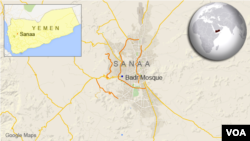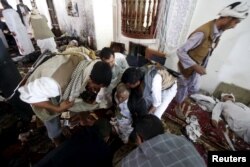Suicide bombers attacked two mosques in Yemen's capital, Sana'a, Friday, killing at least 137 people and wounding about 350.
At least four bombers carried out the attacks during midday prayers at the Badr and al-Hashoosh mosques, which are linked to the Houthi rebels who control the capital.
Officials say the bombers blew themselves up both inside and outside the mosques, looking to kill those trying to escape. Witnesses say blood, body parts, and charred victims were everywhere.
The Yemeni branch of Islamic State is claiming responsibility. It put out an online statement calling the bombings "just the tip of the iceberg."
The extremists also say they were behind this week's massacre at the national museum in Tunisia, killing 23.
White House spokesman Josh Earnest would not confirm the claims, saying there was no clear evidence yet tying the group to the attacks. But he said "It does appear that these kinds of claims are often made for a perception that it benefits their propaganda efforts.''
Whether or not Islamic State was actually behind the attacks, one U.S. official told VOA Friday Islamic State seems to be "quite liberal" in taking responsibility for such attacks.
The official also urged caution in linking the Yemen and Tunis attacks.
“Given the rapid succession of the attacks, one should have a strong hypothesis that there’s coordination,” said Daveed Gartenstein-Ross, a senior fellow at the Foundation for Defense of Democracies."
Analysts also say Islamic State thrives on propaganda and publicity.
The United States condemned the attacks in Yemen.
The U.S. State Department called upon all actors within the country to halt unilateral and offensive military actions and stressed the way forward for Yemen must be through a political solution.
U.N. Security General Ban Ki-moon, who also condemned the blasts, called on all sides in the ongoing fighting in Yemen to "immediately cease all hostile actions and exercise maximum restraint."
Separately, the U.N. Security Council condemned Thursday's attacks on the international airport in Yemen's main southern city, Aden, and an airstrike Thursday on the presidential palace in Aden.
Security forces loyal to former leader Ali Abdullah Saleh, the longtime leader who was ousted in a 2011 popular uprising, attacked the airport and battled militia loyal to President Abd-Rabbu Mansour Hadi.
The fighting forced the airport's closure. The two sides also clashed in other parts of the city.
Four pro-Saleh fighters and two militiamen were killed in the clashes.
Later, an unidentified warplane launched a missile at the presidential palace. Hadi was not harmed in the attack.
Hadi last month escaped house arrest by Houthi rebels allied with Saleh and fled to Aden in a bid to re-establish his authority in the politically fractured nation.
The United Nations, Arab Gulf nations and several western countries, including the United States, have all issued statements supporting Hadi.
Meanwhile, the international medical humanitarian organization Doctors Without Borders (MSF) has reporting that it has received at its hospital in Aden 63 wounded victims of recent clashes there.
Most patients treated in MSF’s emergency surgical unit were suffering from gunshot wounds, with 12 requiring urgent surgery, the group said in a statement issued Friday.
“We may receive more patients and it is all the more crucial that all parties to the conflict facilitate unhindered access of patients and ambulances to health structures, including to MSF's emergency unit,” said Dounia Dekhili, manager of MSF's programs in Yemen.
Some information in this report was provided by VOA's Jeff Seldin, AP, AFP and Reuters.











